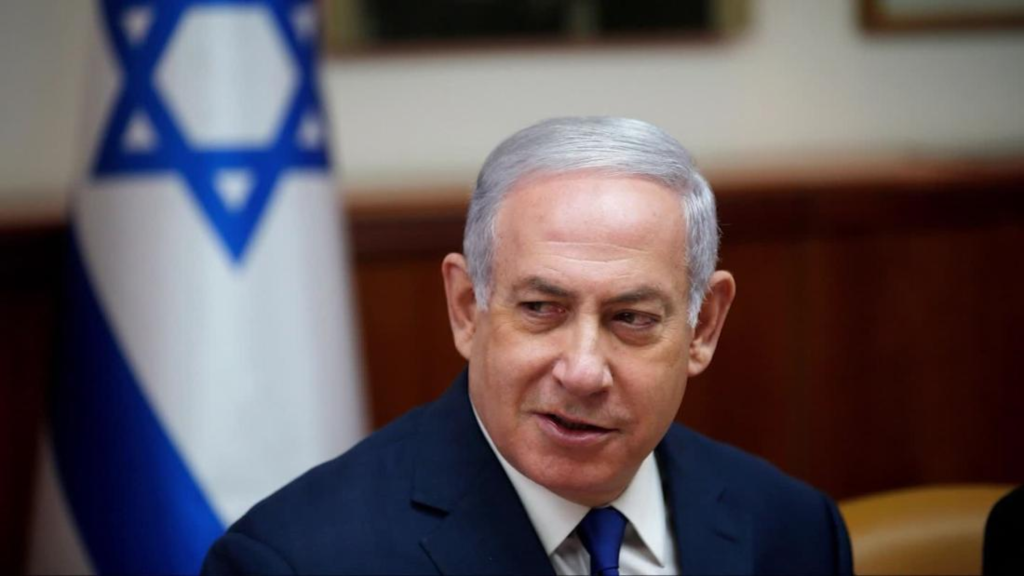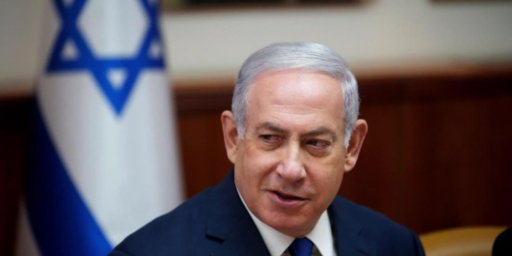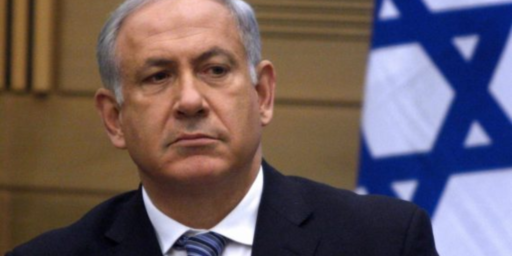Israeli Election Too Close To Call
As many expected, the initial returns from the Israeli elections are too close to call.

Israelis went to the polls yesterday for the second round of elections this year. The first round, which took place in April and appeared to enure to the benefit of Prime Minister Benjamin Netanyahu and his Likud Party, ended up being insufficient after it became clear in May that Netanyahu would be unable to form a working majority in the Knesset. As a result, the nation has spent the better part of the summer locked in the same political battle it saw in the spring between Netanyahu’s Likud Party and the “Blue and White” Party led by former Israeli Army Chief of Staff Benny Gantz.
As expected, neither of the major parties appears likely to win enough of a percentage of the vote on its own to win a Knesset majority. This means that one party or the other will have the chance to try to form a government by creating a coalition with other, smaller parties. As things stand now, the results are far too close to call, but the trend is suggesting that Gantz may be the one to get the first crack at the right to form a government:
JERUSALEM — Israel’s election was too close to call early Wednesday, with neither Prime Minister Benjamin Netanyahu nor his chief rival, the former army chief Benny Gantz, a centrist, immediately commanding enough support to form a majority coalition, according to exit polls.
But Mr. Gantz’s Blue and White party appeared to have come out ahead of Mr. Netanyahu’s conservative Likud, giving a small third party the power to decide the outcome. And his avowed desire to force a unity coalition including both their parties made it likely that, if the projections held, Mr. Gantz would be given the first chance of forming a government.
The murky outcome itself was a humiliating blow to Mr. Netanyahu, 69, the nation’s longest-serving prime minister, who forced the do-over election when he failed to assemble a coalition in May, rather than let Mr. Gantz have a try. For the second time in a row, his onetime deputy, Avigdor Liberman, denied Mr. Netanyahu a majority, this time urging the formation of a unity government.
“According to the current results, Netanyahu did not complete his mission,” Mr. Gantz told a crowd of cheering supporters in Tel Aviv early Wednesday. “We did.”
“Israeli society is strong,” he added, “but it is wounded, and the time has come to heal it.”
Long renowned as a political magician, Mr. Netanyahu campaigned frenetically right up until the polls closed Tuesday night, warning right-wing Jewish voters that Arabs were turning out in large numbers and flouting Election Day bans on campaign propaganda to spur his supporters into action.
Looking visibly deflated and sipping frequently from a glass of water, Mr. Netanyahu told a small but loud crowd in Tel Aviv that he would wait for the actual results, but planned to enter negotiations to establish “a strong Zionist government and prevent a dangerous anti-Zionist government.”
“There won’t be, there can’t be a government that relies on the anti-Zionist Arab parties, parties that deny Israel’s very existence as a Jewish and democratic state,” he said. “Parties that glorify and praise bloodthirsty terrorists who murder our soldiers, our citizens and our children. That simply cannot be.”
With indictments against him looming in three corruption cases, the election’s less-than-vindicating apparent outcome would put his future in grave jeopardy. As prime minister, he could stay in his post even if indicted, under Israeli law. And he could press his coalition to grant him immunity from prosecution. But as a lesser minister or ordinary lawmaker, he would have to resign if charged.
Israeli exit polls have often proven unreliable, and the official results, expected to trickle in overnight, could change the picture sharply. Many Israelis recalled the election of 1996, when they went to bed with the Labor leader Shimon Peres as the winner and woke up in the morning with Mr. Netanyahu as their next prime minister.
More from The Washington Post:
Both main parties in Israel’s snap do-over election were locked in a dead heat on Wednesday, with over 90 percent of the vote tallied. The inconclusive result was almost certain to trigger weeks of political infighting, the same uncertainty that set this unusual process in motion in the first place.
As the results continued to trickle in, both Prime Minister Benjamin Netanyahu, the leader of Israel’s ruling Likud party, and his chief rival, Benny Gantz, the head of the centrist secular Blue and White faction, immediately began jockeying for the endorsement of smaller parties whose support could propel either one to a ruling majority of 61 seats in the Knesset, Israel’s parliament. The two parties have an estimated 32 seats each in the new parliament.
At the center of the stage was the unlikely figure of Israel’s President Reuven Rivlin, who in the coming days will task either Netanyahu or Gantz with the first chance at forming a government. Rivlin gave no indication as to which way he would go, but he had already chosen Netanyahu after a similar inconclusive vote in April.
When Netanyahu failed to form a coalition after that vote, he triggered this unprecedented second election. Now Likud operatives are even discussing the prospect of a third vote in the months ahead.
In a statement, Rivlin’s office made clear that a third election was to be avoided at all costs.“The president will be guided by the need to form a government in Israel as quickly as possible and to implement the will of the people as expressed in the results of the election, as well as the need to avoid a third general election,” the statement read.
Political analysts underscored the complexity of the situation, arguably even more intractable than the aftermath of the April vote, in which Netanyahu had emerged a hair ahead of Gantz.
“It’s not only that the two parties are the same size, but also the blocs are the same size,” said Emmanuel Navon, a political scientist and foreign policy expert at Tel Aviv University. “The president will have to get them to form a unity government and Rivlin can decide to give the job to whoever he wants to, although he must be realistic.”
Netanyahu said he is prepared to meet with the leaders of other right wing parties on Wednesday afternoon and Gantz’s Blue and White party announced late on Tuesday that it had formed a negotiating team.
Dressed in sports clothes, Gantz was up early Wednesday morning. “We are waiting to see the final results,” he said, speaking to reporters outside his home. “In a day or two we will know and then we will create a strong and broad unity coalition in the State of Israel.”
As of Wednesday morning, Gantz had already reached out to Ayman Odeh, leader of the Joint List, the conglomeration of four Arab parties that scored remarkably well in Tuesday’s election, securing 12 seats.
“The main thing is that Israeli Arabs have made their voices heard and what they want is to stop a right wing government headed by Netanyahu,” said Odeh on Wednesday, in a news conference outside his home in Haifa. “There is clearly a price for incitement.”
A key feature of Netanyahu’s campaign had been race baiting Israel’s Arab citizens, accusing them of voter fraud and of trying to “take over” the country.
“Our direction is very clear,” Odeh said. “We want to change Netanyahu’s government but we are not in anyone’s pocket.”
Odeh said he would consider taking the unprecedented step of heading the country’s formal opposition, something that has never been done by an Arab party in Israel but it would afford him the opportunity to meet with high level visiting dignitaries and access to some sensitive security information.
In a meeting with journalists ahead of the election, Odeh said that he would ask whoever turns to him for support to cancel the controversial Nation State Law, move forward with a peace process with the Palestinians and address some of the hard pressing social issues in Arab society in Israel, including infrastructure projects and stopping home demolitions.
But whether Odeh’s faction would support Gantz, a former general, was far from a given. His Joint List includes a communist party and members of the Muslim Brotherhood in Israel, both of which would have to agree.
Speaking outside his home in the Israeli settlement of Nokdim, Avigdor Liberman, Netanyahu’s erstwhile ally and the leader of the secular nationalist Yisrael Beiteinu faction, told Israeli media on Wednesday morning that to avert a democratic crisis Netanyahu and Gantz had no choice but to form a broad coalition.
“It is a shame to waste more time, we need to get on this track as soon as possible,” Liberman said, whose party has garnered around nine seats, making it key to any coalition.
Israel’s Central Election Committee said that the final vote tally and seat assignments would likely come on Thursday afternoon.
The first step after the official vote is reported and known would be for one of the top two parties to make the effort to try to pull together a coalition of parties that would equal 62 votes in the Knesset, which would be enough to form a majority. Traditionally, that right has first gone to the party that is in the lead when the final results are known, even when that lead is so small as to be nearly statistically insignificant which appears to be where these numbers are headed at the moment. Ultimately, though, the decision on who gets to make the effort first falls to Israel’s President, Reuven Rivlin, whose position is largely symbolic but nonetheless an important one in this context. The law also gives the President some authority to attempt to influence the formation of a government by pushing one part or the other to reach agreements they might not otherwise agree to.
Toward that end, it has been suggested in the past several days that Rivlin may try to use a close outcome like the one we appear to be headed toward to encourage the formation of a “national unity” government. Such a government would include both Likud and Gantz’s “Blue And White” coalition, as well as other major parties. The stumbling block there though, would be the makeup of the cabinet since it is clear that most of the opposition would not support a government where Netanyahu remains as Prime Minister while Netanyahu would want to hold on to that seat, not the least because it would mean that he would not have to step aside if criminal charges were brought against him as Israeli police have recommended. In any case, we’ll have to wait to see what happens in the next several days to have an idea of what the future might hold.




I’m a bit surprised at the amount of pleasure I found when discovering the following headline in this morning’s NYT –
The End of the Netanyahu Era
By Shmuel Rosner
As if a pinpoint of light, down a long, dark, mind numbing, soul crushing tunnel.
Nothing will change.
Settlements will expand.
Palestinians will die.
The US Congress will show fealty to Israel.
Meet the new boss, same as the old boss.
At this point, the obvious deal is to offer Netanyahu the equivalent of a pardon or immunity in exchange for stepping down and retiring from politics.
But then, it would be hard for him to decide which he values more.
Latest on this:
Ok, this is looking like it might happen this time. Apparently Netanyahu is having real issues forming a majority.
We’re two weeks away from Netanyahu’s pre-trial hearing on corruption allegations.
He tried to stay in power by any means necessary, so what is he going to do now? When would he have to resign? Does he still have time to nuke Iran?
If reporting is right, Trump, when asked about about Netanyahu said “our relationship is with the State of Israel” — that doesn’t sound good for Bibi.
All that said, he’s been down before and survived.
Most succinct description of current situation:
Unclear who won. Clear Bibi lost.
Perhaps Trump will be in a similar situation next year…a pity he can only pardon himself and his various toadies from federal charges but not state charges…
No wonder Trump likes Bibi…they’re both sleazy bigoted anti-democratic crooks…